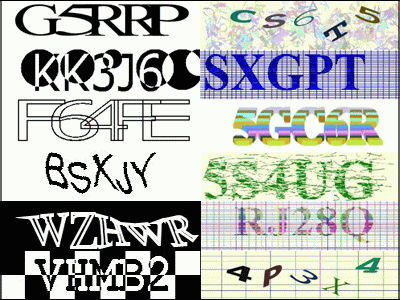Sick of internet advertisements? Like it or not, banner, contextual, and even pop-up ads have become an integral part of nearly all modern websites. While it’s understandable that all of our favorite websites need a way to subsidize server costs, and web-based businesses must maintain profits in order to survive, where is the line drawn?
When does a website become more of an advertisement and less of a source of information? More importantly, when do advertisements compromise the security and integrity of the site that they are displayed on?
Just when you got used to the standard forms of internet advertising, a new up-and-coming type of ad is aggressively making a name for itself in the market. If you’re already sick of internet advertisements, get ready to be thoroughly annoyed. Introducing… CAPTCHA advertising!
A Brief History Of CAPTCHA
Before we draw conclusions on the ethicality and practicality of CAPTCHAs containing advertisements, let’s take a minute to reflect on the history and purpose of CAPTCHA forms. The term CAPTCHA, or Completely Automated Public Turing test to tell Computers and Humans Apart (whew, that’s a mouthful), was first coined by four professors at Carnegie Mellon University. The professors went on to make a variety of CAPTCHA forms that became popular in the year 2000.
As the name implies, CAPTCHAs were created as a way for websites to differentiate a real human visitor from a bot. CAPTCHA forms allow webmasters to display an image which contains a random string of letters and numbers. Visitors to websites utilizing CAPTCHAs are then be prompted to correctly enter the text displayed in the image in order to proceed with certain actions such as registering a new account, or leaving a comment on a blog or forum.
This is done in order to prevent bots from mass registering accounts, automatically posting spammy comments, and sending spam messages to a large amount of registered users among other things. CAPTCHAs have advanced over time to become less vulnerable to bots and scripts attempting to solve the codes while striving to remain user-friendly.
How CAPTCHA Advertising Works
The evolution of CAPTCHAs has inevitably led to a form of advertising. In essence, the core concepts and purpose of CAPTCHAs will remain unchanged. Don’t worry, you’ll still be shown an image that displays a line of text which must be entered correctly in order to proceed. The difference, however, lies in the presentation of the CAPTCHA. Instead of seeing a distorted image that contains randomly generated characters, you will see an image containing text that has been carefully selected by an advertiser.
These advertisers, which will likely span a number of big name national and international corporations, will submit their ads to a company capable of displaying them. Webmasters looking to monetize their CAPTCHA forms will also sign up with this company, and will be given a script that places the customized CAPTCHA on select portions of their website. The advertiser will then pay the said company a set amount of cash every time the CAPTCHA is successfully filled out, and the webmasters will be paid a cut of what the advertiser is paying. The company, acting as an intermediary, then collects the change remaining after paying out the webmaster.
The Company Behind It All
Currently, there is only one company that is actively working as the middleman between advertisers and webmasters in order to display CAPTCHA ads — that company is AdCopy. With physical addresses listed in New York City and Philadelphia, AdCopy is currently beta testing the new form of internet advertising. Advertisers and website owners interested in trying out the service can request a beta invite into the system on AdCopy.com by filling out a short form. The site boasts of a self-serve advertising platform that will allow advertisers to create and upload their ads directly to their system using a simple interface.
While no details are given as to who exactly is behind AdCopy, the company claims to consist of a group of veterans in the industry. The site also points out that they are supported by First Round Capital and angel investors. Their contact information is also readily available on the site. While access is currently invite-only during the beta phase, it can be expected that the service will open up to the public once it is officially launched.
Corporate And Consumer Benefits
It may seem like a strange way to advertise, but upon closer inspection, it’s pure genius. Think about it, large companies spend millions and millions of dollars branding their name through commercials that you may or may not be paying attention to. Using CAPTCHA ads, you will be left without a choice; you’ll have to interact with the ad in order to access certain areas of participating websites.
Aside from the forced recognition factor, this also gives advertisers a chance to engrain their message into your mind in a way that was previously unavailable. McDonald’s, for example, may run an ad displaying the image of a Big Mac, fries, and a drink accompanied by the text “I’m lovin’ it.” The goal of their ad being not only to leave their name and image fresh in your mind, but also to make a subliminal connection between McDonald’s and loving their food. This association is only reinforced by requiring you to type it in. Clever? Absolutely. Ethical? I’ll leave that for you to decide.
While it’s not as easy to name the potential consumer benefits of such ads, there are a few positives to consider. For one, some CAPTCHAs are barely legible and frankly absurd. There are few things more frustrating than having to enter a nearly unreadable CAPTCHA character string nine times before coming up with a positive match. Believe me, advertisers are going to make their CAPTCHA’s text clear as day. Additionally, there is always the off chance that you will be shown an ad that exposes you to a new product or service that you are interested in.
Potential Issues And Complications
While CAPTCHAs definitely do their part in preventing bots from using websites in unintended ways, they don’t always work. Where there’s a will, there’s a way. Spammers who are utilizing bots can and will find a way around having to fill out CAPTCHA forms manually. Because of this, CAPTCHAs are constantly evolving to stay a step ahead of programmers and their bots.
At present, there are several ways to get around standard CAPTCHA ads of almost any level of complexity. Dated CAPTCHAs are easily crackable using PHP scripts like reCAPTCHA, while more advanced forms are a little bit more difficult to get around. This is just a slight annoyance for spammers, however. The people behind these bots have no problem paying companies such as Bypass Captcha a measly $14 for their offshore employees to manually solve 2,000 CAPTCHAs.
With scripts and services that nullify CAPTCHAs readily available, what steps are companies like AdCopy taking to combat them? If AdCopy CAPTCHAs are easily bypassed, the excessive workload and negative visitor experience is more than enough to discourage webmasters from using them, despite the monetary gain. Additionally, advertisers aren’t going to be happy paying for their ad to be placed in front of an automated script or a professional CAPTCHA solver.
Keeping these potential issues in mind, it also leads us to question the measures has AdCopy taken to prevent abuse. AdCopy CAPTCHAs are currently yielding webmasters an average of 10 cents per successful engagement. With companies like Bypass Captcha charging less than one cent to manually fill out a CAPTCHA, what’s to stop people from paying them to fill out CAPTCHAs for financial gain?
While these are questions that need to be answered, I’d think (and hope) that AdCopy has already thought about and addressed these issues. We’re likely to see further details outlining the security measures and precautions they’ve taken to prevent spam and fraud when their ad platform is publicly launched. Like any variety of CAPTCHA, however, the tricky part is going to be staying one step ahead of the people attempting to exploit the system.
What To Expect Going Forward
Expect a number of ad platforms to pop up in the near future that mimic the AdCopy model of CAPTCHA advertising. Companies are likely to attempt to differentiate themselves with different costs, expanded placement options, improved statistical tracking, and increased opportunities for advertisers to customize their ads. Websites will begin to implement these CAPTCHA ads as they become more widely known and publicly available.
Though the concept of CAPTCHA advertising is simple, the possible issues and complications leave us with a number of questions that need to be answered. Will CAPTCHA ads become a standard in internet advertising? What will internet users reaction be to such ads? Will this breed of CAPTCHAs be as viable as other forms? Only time will tell.
With that, I ask you, what is your opinion on CAPTCHA ads? Are you insulted or indifferent?





GIPHY App Key not set. Please check settings
33 Comments